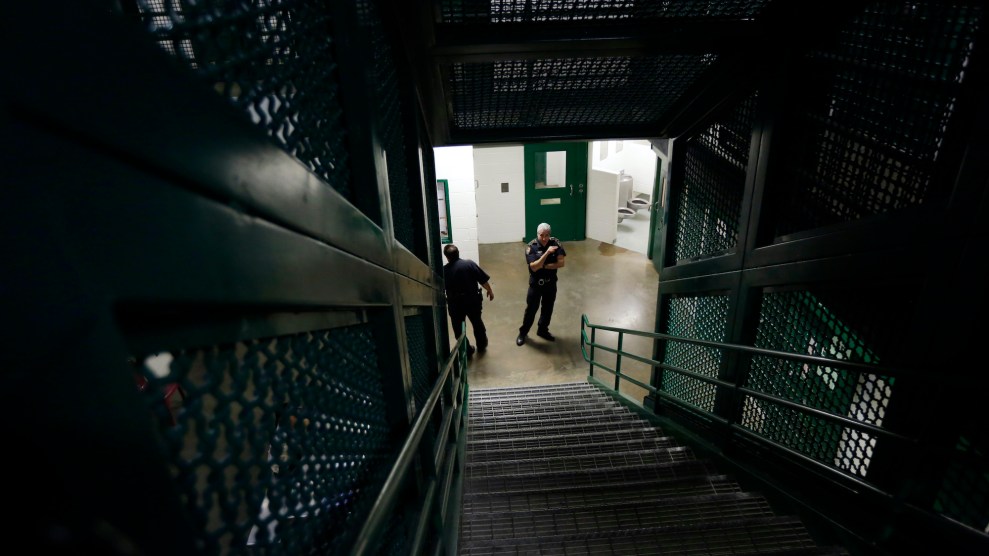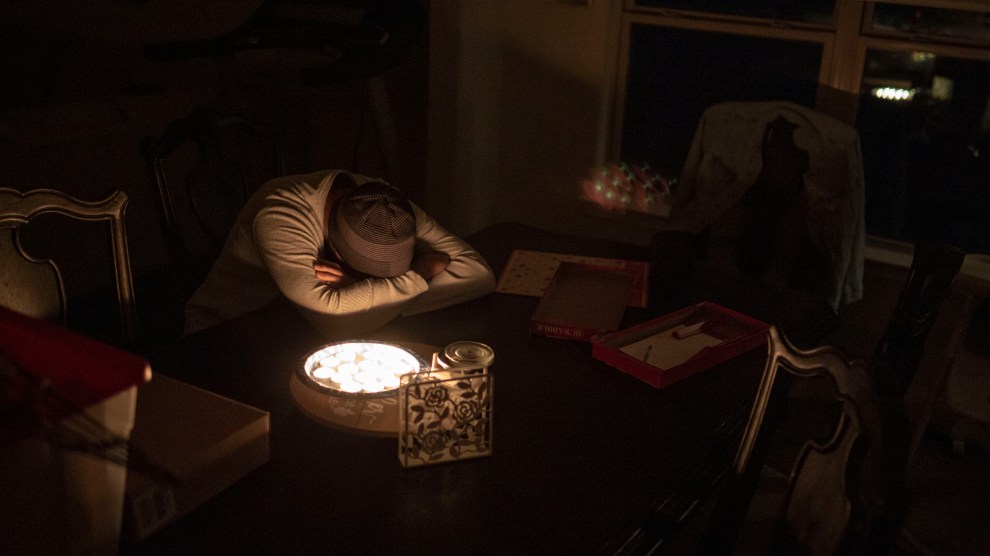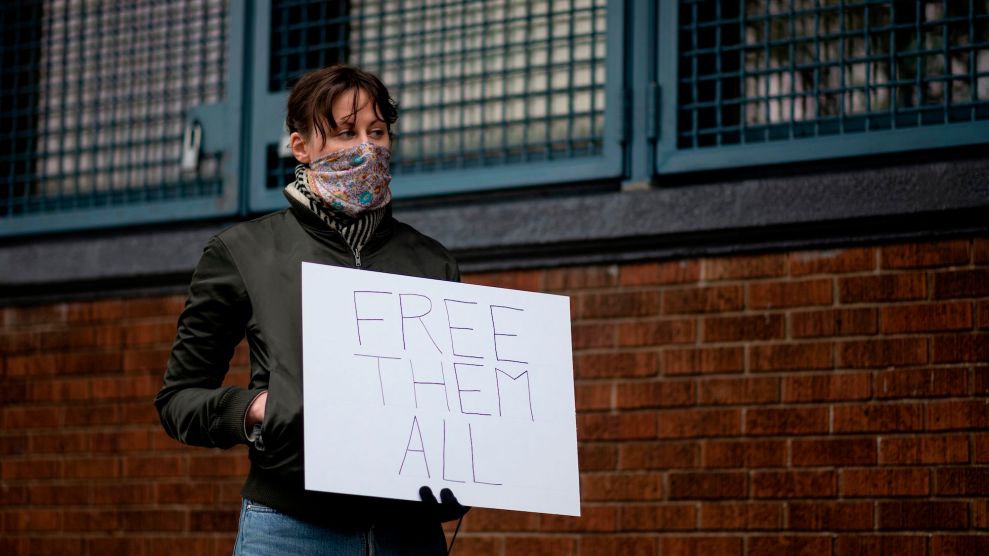
The Harris County Jail in 2014Eric Gay/AP
On the seventh floor of the Harris County Jail in downtown Houston, Andrew Garamillo wrapped a blanket around his shoulders as he walked around his pod, trying to stay warm. Like the millions of Texans plunged into darkness and subzero temperatures this week as a winter storm took out the state’s electrical grid, Garamillo was cold and had no running water. But inside the jail, where he had been waiting for a court hearing for almost seven months, there was little he could do to take care of himself. So he huddled in his uniform and his one blanket, trying to make the two bottles of water he had received from guards last for a third day.
As of Thursday, the Harris County Jail held 8,980 people, 87 percent of whom were stuck there pre-trial—typically because they can’t afford bail. As temperatures plummeted and the state was blanketed in snow and ice, those detainees were trapped behind bars, unable to take basic measures to keep themselves warm. The same is true across Texas, where incarcerated people and their loved ones are reporting brutal cold, scarce drinking water, and backed up toilets inside jails and prisons. “A lot of these things are things that every Texan is going through, but it’s different because they are locked in a cage,” says Nick Hudson, policy and advocacy strategist at the Texas ACLU.
“I’m at my mom’s house because my house didn’t have electric and it didn’t have running water or anything because of the storm,” says Nichole J., who lives in northeast Texas. But her husband, who is incarcerated in the Clemens Unit south of Houston, doesn’t have that option. (Mother Jones is withholding the full name of some incarcerated people and their loved ones because they are afraid of retaliation.) “They’re stuck,” she says. “It’s up to the warden and the [correction officers] to make sure that they’re in living conditions—and they’re not.”
Texas has a long history of leaving incarcerated people vulnerable to natural disasters and extreme conditions. In the summers, temperatures in some prison units sometimes rise above 100 degrees, but many units do not have air conditioning; at least 23 state prisoners have died from extreme temperatures behind bars since 1998. Yet the Texas Department of Criminal Justice has fought a bill and a lawsuit attempting to address issues with temperatures inside. During Hurricane Harvey in 2017, prisoners and jail detainees on the southeast Texas coast were forced to ride out the storm rather than follow evacuation orders. In one unit, people claimed the water was up to their knees. (The TDCJ denied their reports.) And in 2018, during another cold snap, prisoners at nearly two dozen state prisons filed complaints about broken or nonexistent heating at two dozen prisons, according to the Houston Chronicle. In response, the TDCJ claimed just one prison had a broken heater, and said it had been quickly repaired.
Now, incarcerated people, their family members, and advocates say people in prisons and jails are once again facing extreme conditions. In the dorms of McConnell Unit, a state prison in South Texas, toilets are clogged and full of waste, and there’s no water for prisoners to wash their hands, says Roxanna M., whose husband is incarcerated there. She says it took a few days of her calling the prison for her husband to get more than one blanket and coat. She’s nervous about what will happen if he loses access to the phones to keep her informed of what’s going on. “What worries me the most,” she says, “Is just to be able to have the basic resources that we need, like our bathing, food, warmth.”
According to Jeremy Desel, communications director for TDCJ, during the worst of the winter storm, nearly all of the system’s 102 prison and state jail units were affected. Thirty-two state prisons had to rely on generator power, and 33 had either no or low water pressure. Desel says that as of Friday morning, power had been restored at all locations and water is back on all but a “handful” of prisons. Prior to the storm, he says, TDCJ sent bottles and tanks of water to be distributed in prisons vulnerable to water problems, as well as extra clothing and blankets to prisoners throughout the system. “We deal with severe winter weather in parts of the state every year and hurricane situations in the southern parts of the state nearly every year as well, so we are very accustomed to both preparation for events and the response to them,” he says. “The difference here is the statewide scope of the emergency.”
Lauren Byrd-Moreno, whose husband is incarcerated in the Clemens Unit, said on Thursday that she’s been getting brief calls from him when the power is not out. She says he talks about avoiding using the bathroom, because in his dorm, the toilets are completely backed up. People who ran out of water tried to collect snow and dripping ice coming in through broken windows, she says.
Byrd-Moreno’s husband is assigned to clean “the rows”—long tiers of cells where, she says, people are lighting fires to stay warm. On Thursday, her husband told her that people have been going to the infirmary “with their feet split open” from frostbite. “He’s not a very dramatic guy, so when he says stuff like that it’s really bad,” she adds. “It’s terrifying, it’s almost crippling. Your hands are just tied behind your back.”
Nichole J., whose husband lives in the Clemens rows, also says that people on the rows were trying to light fires to stay warm, using toilet paper, scrap paper, and in one case, their socks as kindling. According to Nichole, her husband asked to see the doctor because he was coughing and struggling to breathe in the cold, but the request was denied. “My husband said it was hard to catch his breath,” she said. To stay warm, she explains, he heats water in his hot pot, fills a water bottle, and tucks it into his socks. “Many of the inmates, my husband included, fear going to sleep because they they’re afraid that they’re going to die in their sleep,” Nichole says. On Thursday, she says he told her corrections officers had done a “blanket check” that morning—taking away extra blankets from anyone who had more than one.
In response to questions from Mother Jones about family members’ description of conditions inside the Clemens and McConnell Units, Desel denied all the allegations and added that prisoners should not have access to phones in either unit due to emergency protocols. Desel says reports of clogged toilets and fires are false. (He could not comment on frostbite cases or broken windows.) “You know, what I think is the biggest headline coming out of this is the fact that we really have seen no significant issues coming out of this very significant event,” Desel says, adding that TDCJ’s command structure and communications had “no reported incidents of any level of significance.”
Every day, Nichole says, when her husband talks to their children, her oldest son comes back with questions. “He’s like, ‘Mom, why are they treating him like that? Mom, why don’t they give him blankets? Mom, Dad is cold.’ Earlier, he was like, ‘Mom, Dad said he can’t feel his toes.'” Each time, she has to tell him there is nothing she can do. “I’m trying,” she tells me. “And it’s sad when your children come up to you and they express concern. They’re children. They shouldn’t have to go through that. They shouldn’t have to wonder if their dad is coming home.”
In the Houston jail run by the Harris County Sheriff’s Office, “they barely give us water,” Garamillo said Thursday on a phone call with Mother Jones and Krish Gundu, cofounder and executive director of the Texas Jail Project, an advocacy group collecting reports about conditions from jail detainees during the freeze. Others inside the Harris County jail have reported the air smells so strongly of urine from clogged toilets they can almost taste it. Officers there were working up to 16 hours straight and sleeping at the jail due to bad road conditions, Harris County Sheriff’s Office spokesperson Jason Spencer says.
Spencer says extra blankets were provided to those who requested them, and that drinking water has been regularly supplied to inmates. (Garamillo reports he never received an extra blanket, and as of Thursday he had received only two 16-ounce bottles of water days earlier.) While the power has gone out intermittently, forcing the jail to rely on backup generators, the temperatures have remained “above the state-mandated minimum of 65 degrees,” Spencer says.
Gundu, who has received calls from people in Harris County and about a dozen other Texas jails as of Thursday, says in big and small jails, people are reporting “pretty much the same—we’re freezing, we’re cold, there’s no running water, food supplies are limited.” Without water, people can’t hydrate, wash their hands, or cook commissary food they have stored. Some, she says, are being told to urinate in buckets. The Texas Jail Project is fundraising to distribute money to people’s commissary and phone accounts, so they can buy something to drink and eat, and check in with their families.
Gundu is particularly concerned about interruptions to people’s medical care in jails. “People with diabetes, they’re dropping sugar levels when the food is late or not enough,” she says. “We were hearing about staph infections even before this winter storm.” One man, she said, told her he was worried about getting his seizure medication.
The situation is, of course, worsened by COVID. Since the beginning of the pandemic, Texas advocates have been hearing reports of minimal testing, broken quarantines, and undercounted COVID deaths. While some counties started issuing citations rather than booking people into jail early in the pandemic, causing jail populations to fall, court delays due to COVID are now causing long backups of people waiting for hearings in jail, including Garamillo. Last March, Texas Gov. Greg Abbott issued an executive order banning jailed detainees who had ever been accused or convicted of a “violent” crime from being released before trial unless they could afford to pay bond.
As a result, Texas jail populations are ticking back up. In January, the Harris County Jail—one of the largest in the country—surpassed 9,000 people behind bars. According to Garamillo, two people on his unit are currently sleeping on the floor because there are more people than beds. (Spencer says there are enough beds for all detainees.) “You have this constant intake, but then nobody’s being moved out,” Gundu says. “We were thinking it can’t get any worse. But clearly, it could get worse and it has gotten worse. We keep saying ‘crisis,’ but it’s like the word has lost meaning.”

















